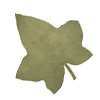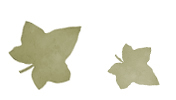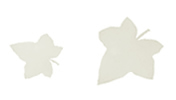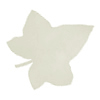|
Sage
- Salvia
officinalis
There
are many species and cultivars of this evergreen,
shrubby perennial, which has a woody base with soft,
oval leaves of silvery, green or purple, and a mass
of deep blue or violet flowers.
The
name Salvia comes from the Latin word Salvare, meaning
‘to cure’ - a Medieval saying echoes this : “why
should a man die while Sage grows in his garden?”
Considered a ‘herba sacra’ [scared herb] by the
Romans, Sage has long been associated with longevity,
a popular country rhyme tells us that “he who drinks
sage in May, shall live for aye.” [Also known as
“He that would live for aye, Must eat sage in May.”]
Sage
extracts have been successfully used to combat old-age
problems, including senile dementia, and is believed
to strengthen the senses and the memory - research
suggests that it may be useful in preventing the
onset of Alzheimer’s disease. It also contains powerful
anti-oxidants which can combat the ageing of cells.
Sage
has an affinity with throats, and makes an excellent
antiseptic gargle and mouthwash for minor infections
and inflammations -try an infusion of a few leaves
to a cupful of boiling water. It is particularly
tonic and stimulating to the gums and mucous membranes,
and the leaves of the sage can be rubbed on to teeth
to make them whiter and to improve gum condition.
As a tea, sage should only be taken occasionally,
and has a pronounced flavour (although apparently
the Chinese find it infinitely preferable to black
tea). An infusion of sage is said to be useful if
you suffer from menopausal night sweats.
A
tonic to the system, sage is deep cleansing, antimicrobial,
antispasmodic, anti-inflammatory and antiseptic.
An infusion of sage can be added to a footbath to
help clear fungal infections of the feet, and it
also makes an effective hair rinse for greying hair,
or for treating dandruff. Sage helps lift the spirits,
relieve tiredness and lethargy, and aides concentration.
Fresh
sage leaves can be rubbed on to stings and bites
- in much the same way as you might rub a dock leaf
on a nettle sting. Incidentally, insects such as
fleas, mosquitos and flies don’t care much for sage
- keep a pot in your home, scatter the dried or
fresh leaves and flowers about, or burn as an incense
or on the fire.
Medicinally
the Purple Sage -Salvia officinalis purpurascens
- variety is preferred. Another commonly used variety
is Spanish Sage - Salvia lavendulaefolia. The oil
is used in many therapeutic treatments, and the
plant itself is similar to the common/garden sage
(S. officinalis) but with narrower leaves and small
purple flowers. Regarded a ‘cure-all’ in its native
Spain, it too promotes longevity, and protects against
all types of infection. Used in treating a range
of problems, including acne, cuts, dandruff, dermatitis,
eczema, hair loss, gum and mouth infections, arthritis,
rheumatism, infertility, colds, headaches, nervous
exhaustion, asthma, and laryngitis.
Sage
has long been used in smudge-sticks to clear space
and banish unwanted energies. Magically it is also
used for protection, psychic ability, mental clarity,
longevity and wisdom.
!
Avoid during Pregnancy and if breast feeding. Not
recommended for epileptics ! |
|











